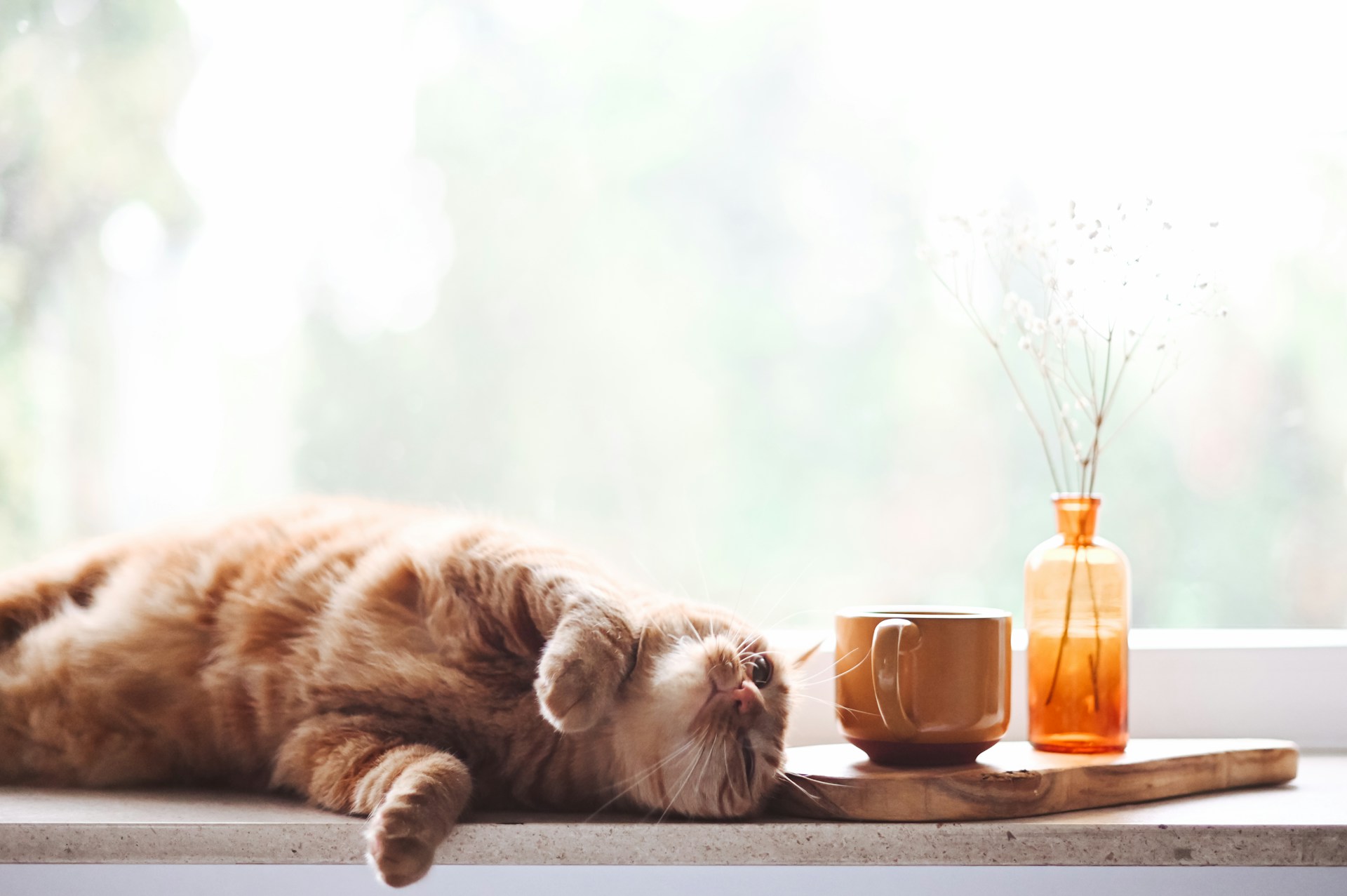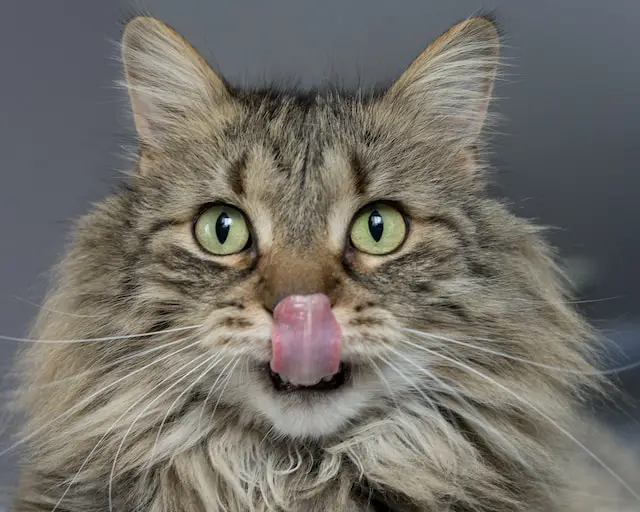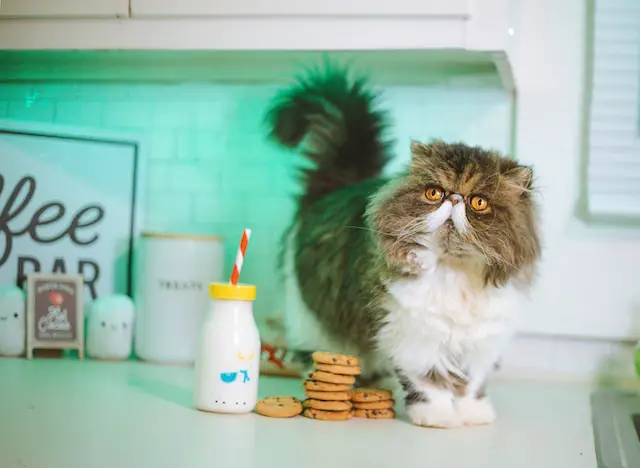Can Cats Safely Consume Matcha? A Complete Guide for Pet Owners
“Can cats drink matcha?” is a question many pet owners ponder as they enjoy their own cup of this antioxidant-rich green tea. As the trend of incorporating healthful human foods into our pets’ diets grows, it’s important to scrutinize whether such practices are safe and beneficial for our feline friends.
This article explores the potential impacts of matcha on cats, diving into the health benefits it offers to humans and questioning if these can be safely extended to cats. Given the significant differences in dietary needs and restrictions between humans and cats, understanding the effects of matcha is crucial for pet owners. Our aim is to equip cat owners with the necessary information to make well-informed decisions about including matcha or any other human foods in their pets’ diets, prioritizing the health and safety of their beloved animals.
What is Matcha? Can Cats Drink Matcha?
Matcha, a cornerstone of traditional Japanese tea ceremonies, has transcended its cultural roots to become a global phenomenon. Unlike regular green tea, which involves infusing water with tea leaves, matcha is made by grinding young, shade-grown tea leaves into a fine powder. This process not only preserves but also concentrates the tea’s nutrients, offering a unique blend of flavor, caffeine, and antioxidants.
The Origins and Production of Matcha
Originating in Japan, the production of matcha is a meticulous process. Tea bushes are covered to prevent direct sunlight for about three weeks before harvest, which increases chlorophyll levels and boosts the production of amino acids, giving matcha its vibrant green color and distinct, umami-rich taste. After harvesting, the leaves are steamed, dried, and then stone-ground into a fine powder, which is then whisked with hot water to produce a frothy, rich tea.
Key Components of Matcha
Matcha is celebrated for its high concentration of antioxidants, particularly catechins, which are believed to have cancer-fighting effects and a positive impact on heart health. Moreover, matcha contains a unique amino acid called L-theanine, which, in combination with caffeine, is said to promote alertness without the jitteriness associated with coffee. However, it’s the caffeine content in matcha that raises questions about its suitability for cats.
Understanding the nutritional content and health benefits of matcha for humans sets the foundation for exploring its effects on cats. While humans can enjoy matcha’s benefits, ranging from enhanced metabolism to improved concentration and detoxification, the critical question for pet owners is whether cats can safely enjoy these same benefits or if the risks outweigh the potential rewards. As we delve into the specifics of matcha’s impact on feline health, it’s essential to keep in mind that what is beneficial for humans isn’t always suitable for our pets.
Can Cats Drink Matcha?
When it comes to sharing our favorite healthful treats with our pets, it’s crucial to consider their specific dietary needs and how certain foods may affect them differently than humans. Given matcha’s growing popularity among health-conscious individuals, many cat owners wonder if this antioxidant-rich green tea powder is safe for their feline friends. In this section, we’ll explore the compatibility of matcha with a cat’s diet, focusing on caffeine content, antioxidants, and other ingredients present in matcha.
Cats and Caffeine: A Risky Mix
A primary concern with matcha for cats is its caffeine content. Cats are significantly more sensitive to caffeine than humans. Even small amounts of caffeine can be toxic to cats, leading to symptoms such as restlessness, rapid breathing, heart palpitations, and muscle tremors. In severe cases, caffeine ingestion can result in life-threatening conditions. Since matcha contains a considerable amount of caffeine, especially compared to other teas due to its concentrated form, it poses a risk of caffeine toxicity in cats.
The Effects of Antioxidants on Cats
While antioxidants like those found in matcha are beneficial for humans, offering protection against free radicals and reducing the risk of chronic diseases, the necessity and impact of such antioxidants are not as clear-cut in cats. Cats have unique dietary requirements and metabolize foods differently than humans. The high levels of certain antioxidants present in matcha may not be necessary or beneficial for cats, and the overall impact on their health is uncertain.
Other Ingredients in Matcha and Their Impact on Cats
Matcha is almost purely ground tea leaves, meaning it doesn’t contain additives that might be found in other human foods or beverages. However, the concern with matcha and cats primarily revolves around its natural components, such as caffeine and theophylline, another stimulant similar to caffeine. Both substances can be harmful to cats in relatively small quantities. Furthermore, the L-theanine in matcha, while beneficial for human cognitive function and stress reduction, has not been shown to have the same effects in cats.
Risks of Matcha for Cats
While exploring the intriguing world of human superfoods and their potential benefits for pets, it’s essential to tread carefully, especially when it comes to matcha and cats. The unique composition of matcha, which makes it a powerhouse of nutrients for humans, can pose serious health risks to cats. In this section, we’ll delve into the specific risks associated with feeding matcha to cats, emphasizing the importance of understanding the dietary limitations and health requirements of our feline friends.
Caffeine Toxicity in Cats
The primary concern with offering matcha to cats is caffeine toxicity. Cats are extremely sensitive to caffeine, and even small doses can lead to adverse reactions. Symptoms of caffeine poisoning in cats include restlessness, rapid breathing, heart palpitations, muscle tremors, and seizures. In severe cases, caffeine toxicity can be fatal. Given that matcha contains a higher concentration of caffeine than standard green tea, the risk of poisoning is significantly elevated, making it an unsuitable choice for cats.
Side Effects of Other Matcha Components
Beyond caffeine, matcha contains other compounds that could potentially affect cats adversely. The high levels of antioxidants in matcha, while beneficial for humans, may not be appropriate for cats. Cats have a different metabolism and nutritional requirements, and the impact of consuming high levels of certain antioxidants found in matcha is not well-documented in cats. Additionally, matcha’s rich content of chlorophyll and other natural chemicals, which are not a standard part of a cat’s diet, could potentially lead to digestive upset or other health issues.
Symptoms of Matcha Poisoning in Cats
If a cat accidentally drink matcha, it’s crucial to monitor them for signs of poisoning or adverse reactions. Symptoms may include vomiting, diarrhea, lethargy, abdominal pain, and changes in heart rate or rhythm. If you suspect your cat has ingested matcha or is displaying any of these symptoms, it is imperative to seek veterinary care immediately. Prompt intervention can mitigate the effects of caffeine toxicity and ensure the well-being of your pet.
Preventative Measures and Safe Alternatives
Understanding the risks associated with matcha ingestion by cats underscores the importance of keeping matcha and other caffeinated products out of reach of pets. Instead of sharing human superfoods with cats, pet owners should explore safe alternatives that cater to the nutritional needs of their feline companions. Many pet-safe treats and supplements can provide similar health benefits without the associated risks. Consulting with a veterinarian can help identify suitable options that support the health and dietary requirements of cats, ensuring they lead long, healthy lives.
Safe Alternatives to Matcha for Cats
In the quest to enhance our cats’ diets with healthful options, understanding what is safe and beneficial for them is paramount. Given the risks associated with matcha for cats, including caffeine toxicity and the potential adverse effects of its high antioxidant content, pet owners may wonder about safe alternatives. Here, we explore cat-friendly options that can provide nutritional benefits without the risks associated with human superfoods like matcha.
Recommendations for Cat-Safe Treats
- Commercially Prepared Cat Treats: Choose treats specifically formulated for cats, which consider their nutritional needs and avoid harmful ingredients. Look for options with added health benefits, such as dental care or hairball control.
- Cooked Meat: Small amounts of cooked chicken, turkey, or fish can be a healthy treat for cats. Ensure the meat is cooked without harmful seasonings, such as onion or garlic powder, and is served in moderation.
- Specialty Cat Grass or Catnip: Many cats enjoy cat grass or catnip, which can provide them with some greens in their diet and are safe for occasional enjoyment.
How to Provide Antioxidants to Cats Without Risks
While cats have different nutritional requirements than humans, they can still benefit from antioxidants in a manner suited to their dietary needs. Consider incorporating cat food formulas enriched with vitamins E and C, which can serve as antioxidants and support your cat’s immune system. Always choose high-quality, age-appropriate cat food that meets the nutritional guidelines established by veterinary nutritionists.
Importance of Consulting with a Vet Before Introducing New Foods
Before making any changes to your cat’s diet or introducing new treats, it’s essential to consult with a veterinarian. A professional can offer guidance tailored to your cat’s specific health conditions, dietary needs, and potential allergies. They can also recommend appropriate portions and frequencies for new treats or supplements, ensuring that any additions to your cat’s diet are both safe and beneficial.
FAQs
In the journey of providing the best care for our feline friends, pet owners often have questions about what is safe and beneficial for their cats to consume. Given the popularity of matcha among humans and the curiosity about sharing its benefits with pets, several common queries arise. Here, we address some frequently asked questions related to cats and their diet, specifically focusing on matcha and other related concerns.
Can Cats Have Caffeine?
No, cats cannot safely have caffeine. Caffeine is toxic to cats and even small amounts found in coffee, tea, and chocolate can lead to caffeine poisoning. Symptoms of caffeine poisoning in cats include restlessness, rapid breathing, heart palpitations, and muscle tremors. In severe cases, it can be fatal. Always keep caffeinated products out of reach of your cats and consult a veterinarian immediately if you suspect your cat has ingested caffeine.
Are There Any Cat-Safe Teas?
While traditional teas and matcha are not recommended for cats due to their caffeine content, there are cat-specific teas available on the market made with ingredients that are safe for feline consumption. These herbal teas might include catnip or other cat-friendly herbs that can provide a soothing experience without the risks associated with caffeine. However, it’s important to use these products sparingly and always under the guidance of a veterinarian to ensure they are appropriate for your pet’s individual health needs.
How Can I Tell If My Cat Has Caffeine Poisoning?
Signs of caffeine poisoning in cats can include hyperactivity, restlessness, vomiting, elevated heart rate, and in severe cases, seizures or collapse. If you suspect your cat has ingested caffeine, it’s crucial to seek veterinary care immediately. The sooner a cat receives medical attention, the better the chances of mitigating the effects of the toxin and preventing more serious health outcomes.
Conclusion: Can Cats Drink Matcha?
In navigating the vast landscape of dietary options for our pets, the exploration of whether matcha is a suitable treat for cats has revealed important considerations. While matcha’s popularity among humans continues to rise due to its health benefits, including a high antioxidant content and energy-boosting properties, these benefits do not translate safely to our feline friends. The potential risks associated with caffeine toxicity in cats make it clear that matcha, and other caffeinated products, should remain exclusively in the realm of human consumption.
The well-being of our pets is paramount, and understanding the distinctions between human and feline dietary needs is crucial. Cats have specific nutritional requirements, and their bodies react differently to certain substances than ours. This guide has underscored the importance of prioritizing cat-safe foods and treats, emphasizing the necessity of consulting with veterinarians before introducing any new elements into your pet’s diet.
Final Verdict on Cats and Matcha
As for our question if can cats drink matcha? Given the evidence and expert advice, the verdict is clear: matcha is not safe for cats. The risks associated with its caffeine content, along with the uncertain effects of other components like antioxidants on feline health, make it an unsuitable choice for pet owners looking to share their healthful habits with their cats.
Prioritizing Cat Safety and Health
Pet owners are encouraged to explore safe, cat-specific alternatives that can provide similar health benefits without the risks. There are many commercially available treats and supplements designed to support feline health, from dental care to digestive support, that are both safe and beneficial for cats.






Comments are closed.